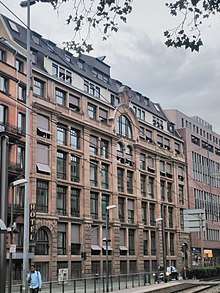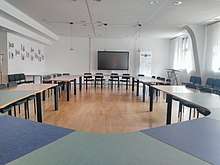Peace Research Institute Frankfurt
The Peace Research Institute Frankfurt (acronym: PRIF, German: Leibniz-Institut Hessische Stiftung Friedens- und Konfliktforschung, short HSFK) is a research institute in Frankfurt am Main focused on violent international and internal conflicts and research of conditions for and promotion of the concept of peace.[2] With over 90 employees (as of 2019), PRIF is one of the largest peace research institutes in Germany.[3]
Leibniz-Institut Hessische Stiftung Friedens- und Konfliktforschung | |
 | |
 Institute's headquarters in Frankfurt. | |
| Abbreviation | PRIF-HSFK |
|---|---|
| Formation | 1970[1] |
| Founder | Hessian Federal Government[2] |
| Type | government funded think tank |
| Legal status | Foundation (nonprofit) |
| Purpose | Peace and conflict studies |
| Location | |
| Coordinates | 50°06′18″N 8°39′52″E |
Official language | German and English predominantly |
Executive director | Nicole Deitelhoff |
Staff | ≈90 |
| Website | www |
The Think Tank for Peace Research and International Relations was established in 1970 as an independent foundation under public law by the State Government of Hesse.[1] PRIF conducts knowledge-oriented basic research, analyses the causes of violent international and internal conflicts, and researches the conditions of peace.
One of PRIF's most essential tasks involves making the findings of the institute’s basic research on the causes of conflicts and violence useful for the practice of developing peace. PRIF provides knowledge and recommendations to public and policy makers.
The research institute's library is open to the public and has an extensive collection of specialised literature on peace and conflict research. Institution cooperates with higher education institutions with especially close links to Goethe University Frankfurt and Technische Universität Darmstadt.[2]
Research departments


Central research topics and perspectives include:
• Arms control, disarmament and non-proliferation
• International organizations, international law and normative orders
• Non-state violent actors, transnational corporations, civil society
• Radicalization and political violence
• Intrastate conflicts, organization and transformation of political rule
• Globalization and local life-worlds
Research at PRIF is mainly structured by its research programmes. With its programme-bound research, PRIF combines basic research that encompasses the entire institute with applied research and its practical implementation.
Since 2018, the Institute's "Peace and Coercion" research programme has focused on the ambivalent relationship between coercion and the establishment and maintenance of peace.[4]
Organization
The Executive Director of the PRIF is Nicole Deitelhoff. Other members of the Executive Board are Christopher Daase, Susanne Boetsch, Peter Kreuzer, Sabine Mannitz and Jonas Wolff.
The Research Council is a body that includes all PRIF scholars. It makes decisions on the research program and on the projects of the individual research departments.
The Board of Trustees, consisting of Hesse’s Prime Minister, the Minister for Science and the Arts, and the Finance Minister of Hesse, three public figures and three elected representatives from within the institute, supervises the management of the institution and approves its budget.
The Advisory Board supports the PRIF on the design and implementation of the institute's research programs. Four-year terms are by appointment of the Board of Trustees which is made up of eight scholars from Germany and abroad.
In 2009 PRIF became a member institute of the Leibniz Association.[5]
Publications
PRIF publishes monographs and anthologies in cooperation with Springer Verlag in the series Studien der Hessischen Stiftung Friedens- und Konfliktforschung. In addition, about 10 PRIF Reports are published annually, analysing the background and developments of political events. The four-page PRIF Spotlights are aimed at a broader public audience interested in peace and security issues. The PRIF Working Papers also appear irregularly and exclusively online, providing insights into current basic research and stimulating scientific exchange. The publications can be downloaded online and print versions can be found in numerous libraries.
 PRIF Library
PRIF Library PRIF Library
PRIF Library PRIF Library
PRIF Library
Since 2018, the publications have been supplemented online by the PRIF Blog, on which PRIF researchers discuss short texts on current issues and debates relevant to peace and conflict research.
In addition to its own series, PRIF publishes the Peace Report annually together with the institutes Bonn International Centre for Conversion (BICC), Institute for Peace Research and Security Policy (IFSH) and Institute for Development and Peace (INEF). Since 2018, it has also been available to download online.[6]
References
- "OSCE Network of Think Tanks and Academic Institutions: Peace Research Institute Frankfurt (PRIF)". osce-network.net. n.d. Retrieved 2 August 2019.
- "Leibniz Institute Peace Research Institute Frankfurt". www.leibniz-gemeinschaft.de. n.d. Retrieved 5 August 2019.
- "The Network: Peace Research Institute Frankfurt". www.nonproliferation.eu. n.d. Retrieved 2 August 2019.
- "Research". www.hsfk.de. n.d. Retrieved 2 August 2019.
- "Organizational structure". www.hsfk.de. n.d. Retrieved 2 August 2019.
- "Publications". www.hsfk.de. n.d. Retrieved 2 August 2019.